Loulou Blu-ray Movie
HomeLoulou Blu-ray Movie 
Cohen Media Group | 1980 | 110 min | Not rated | No Release Date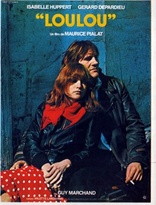
Price
Movie rating
6.6 | / 10 |
Blu-ray rating
| Users | 0.0 | |
| Reviewer | 3.5 | |
| Overall | 3.5 |
Overview
Loulou (1980)
A bored wife leaves her husband for an unemployed, petty criminal.
Starring: Isabelle Huppert, Gérard Depardieu, Guy Marchand, Frédérique Cerbonnet, Humbert BalsanDirector: Maurice Pialat
| Drama | Uncertain |
| Foreign | Uncertain |
| Romance | Uncertain |
Specifications
Video
Video codec: MPEG-4 AVC
Video resolution: 1080p
Aspect ratio: 1.66:1
Original aspect ratio: 1.66:1
Audio
French: Dolby Digital 2.0
Subtitles
English
Discs
50GB Blu-ray Disc
Single disc (1 BD)
Packaging
Slipcover in original pressing
Playback
Region A (B, C untested)
Review
Rating summary
| Movie | 3.5 | |
| Video | 4.0 | |
| Audio | 3.0 | |
| Extras | 2.5 | |
| Overall | 3.5 |
Loulou Blu-ray Movie Review
Reviewed by Jeffrey Kauffman May 19, 2016Note: This film is available as part of The Films of Maurice Pialat: Volume 1.
In my recent Death
Walks Twice: Two Films by Luciano Ercoli Blu-ray review, I mentioned how it’s likely that talking about giallo to even the most
ardent film buff would probably result in a response offering only one of two names, Dario Argento or Mario Bava. Similarly, if one were to ask
a film fan to name a French director whose work spanned the 1960s through the 1980s, my hunch is most folks would tend to gravitate
toward iconic names like Jean-Luc Godard, François Truffaut or Claude Chabrol. Nouvelle Vague so famously subsumed so much of
modern (meaning post-World War II) French cinema that some creatives (like Chabrol in fact) found themselves akin to square pegs being (or
at least attempted at being) thrust into round holes. Maurice Pialat is not a name known to many Western film lovers, even those
who consider themselves Francophiles, and it’s interesting to note that Pialat often works in a style that would frankly make him more at
home with his nearby European neighbors, the Italians, since Pialat frequently favors a neorealistic approach that is long on character, gritty
verisimilitude, and a sometimes lax approach toward traditional plot structure and three act “arcs”. Pialat also tends to eschew some of the
stylistic flourishes that populate the Nouvelle Vague catalog, especially in terms of editing. Instead of, well, Breathless cutting (sorry), Pialat often indulges in long, drawn out single takes that
allow his actors to fully explore the nuances of their characters, even if at times dialogue is fitfully minimal. It’s a technique that immediately
puts Pialat at odds with many of his (more) famous contemporaries, and may account at least in part for Pialat’s strange lack of recognition
on this side of the pond. Cohen Film Collection, quickly becoming a haven for cineastes (if it hasn’t already), is helping to ameliorate that
problem by releasing a trio of Pialat’s work spanning from 1974 to 1980, along with a revealing documentary about the director.

Loulou both looks backward to previous Pialat films like Graduate First as well as forward to future offerings like A Nos Amours, with its emphasis on perhaps at least slightly unstable characters who have a fondness for certain carnal activities. Pialat often seems to be winking (if only a little bit) at perceptions of what it means to be French, and he’s probably nowhere more overt than in Loulou, a film that seems to almost delight in exploiting what some might see as stereotypes about the French soul. That said, despite a somewhat gritty ambience Loulou is in some ways the most cinematic of the three movies contained in The Films of Maurice Pialat: Volume 1 , in that it’s obviously a fictional work and therefore somewhat removed from the more quasi-verité aspects of both La Gueule ouverte and Graduate First.
Loulou takes what is in essence the hoary trope of two folks from different sides of the tracks engaging in a romance. Think Love Story, albeit with a decidedly less fairy tale aspect and a completely different set of tragedies, all of it filtered through a distinctly French sensibility that conflates bursts of sexuality with a perhaps slightly frightening propensity toward violence. Gérard Depardieu portrays the titular Loulou, a wastrel of sorts who’s nonetheless seemingly irresistible to women. That includes the decidedly more middle class Nelly (Isabelle Huppert), who ends up discarding much of her lifestyle in pursuit of a relationship with Loulou. That includes an on again, off again dalliance with André (Guy Marchand), a man with decidedly more command of his finances than the lackluster Loulou.
Some might see the main male character’s name as a deliberate pun of sorts on Lulu, the temptress of fable (and in this case, Alban Berg’s opera) who lures men to their fates. In the case of the Franz Wedekind character who became source material for Berg and many others (including Georg Wilhelm Pabst’s Pandora's Box), there was really no socioeconomic subtext to speak of, and Lulu tended to stand for Womankind as a kind of amorphous if awfully destructive whole. Loulou makes it clear that there is a socioeconomic disconnect between these characters, but oddly even that fails to fully explain their sometimes irrational behaviors (on both ends of the “success” spectrum).
Despite its overtly dramatic (as in theatrical) qualities, Loulou still resides quite comfortably in the realistic confines of the typical Pialat film. Handheld cameras and what seem to be at times at least partially improvised scenes give Loulou a kind of chaotic but quite realistic mien, even if the overall story arc is considerably more florid than at least some of Pialat’s other offerings. That improvisational feeling tends to give the film a somewhat loose structure at times, something that will probably keep some viewers at an emotional distance from its characters, but the performances are quite winning within what is ultimately a rather drab and depressing story.
For an probably more generally positive view of Loulou, Svet Atanasov reviewed the French release here.
Loulou Blu-ray Movie, Video Quality 
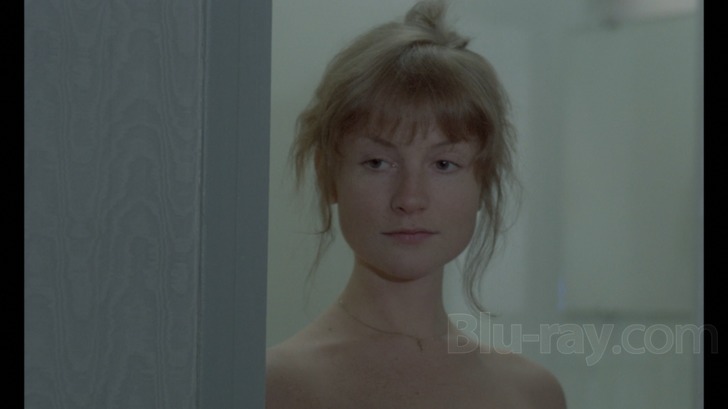
Loulou is presented on Blu-ray courtesy of Cohen Film Collection with an AVC encoded 1080p transfer in 1.66:1. The press materials accompanying this release don't really give much information on the provenance of elements or masters, and so it's unclear whether this is culled from the same source as the French release Svet reviewed some time ago. In doing a completely non-scientific and cursory comparison of screenshots, it would appear that if this is not identical to the French release, it's at least very similar, though the overall color space of the Cohen release may be just a tad cooler (again this is based on comparisons only, I have not seen the French release). As Svet noted in his review, there appear to have been some at least slight denoising filters applied here, something that's especially noticeable in some of the early scenes in the club, where detail levels are a little "waxy" looking (there are actually a couple of moments that are undeniably out of focus, something that doesn't help matters). That said, there's a very noticeable grainfield that's especially apparent in the frequent darker, often blue tinged, sequences that take place either at night or in darkened environments. However, I did not notice any compression artifacts like Svet saw in the French release.
Loulou Blu-ray Movie, Audio Quality 
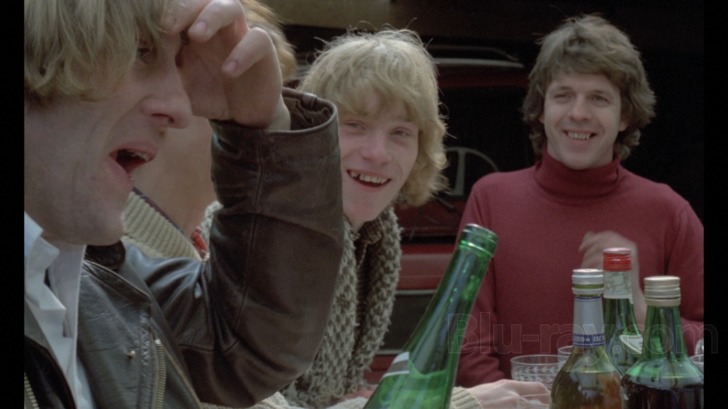
Perhaps surprisingly all three features in The Films of Maurice Pialat: Volume 1 sport Dolby Digital 2.0 mono tracks. The French release of Loulou, the only Pialat film in this set to have appeared previously on Blu-ray, featured a lossless DTS-HD Master Audio Mono track. As longtime readers of my Cohen reviews know, I took the label to task for their earlier authoring of discs which tended to default to lossy Dolby Digital tracks rather than also included lossless tracks, but in this case there are no lossless tracks. That's ultimately not a huge deal, given the relatively small scale sonic ambitions of all three films, though it's at least arguable that the Mozart quotes in La Gueule ouverte might have gained a bit of "oomph" in a lossless setting. Dialogue and effects are both rendered cleanly on all three tracks, with no damage of any kind to warrant concern.
Loulou Blu-ray Movie, Special Features and Extras 
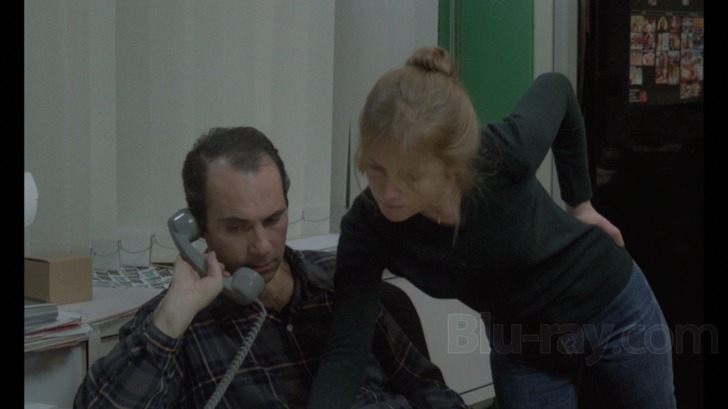
- Interview with Dominique Maillet (1080p; 20:01)
- Interview with Isabelle Huppert (1080p; 14:18)
- Interview with Patrick Grandperret (1080p; 28:07)
- Interview with Pierre-William Glenn (1080p; 32:02)
- Interview with Yann Dedet (1080p; 13:03)
- Original Trailer (1080p; 2:06)
- Re-Release Trailer (1080p; 1:32)
Loulou Blu-ray Movie, Overall Score and Recommendation 
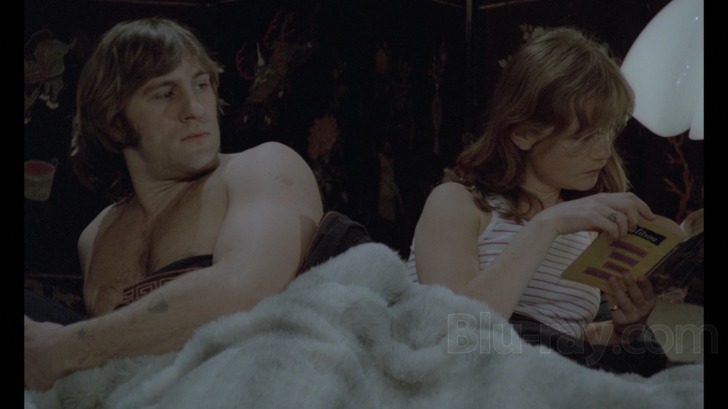
Perhaps because it seems more overtly histrionic than its siblings in The Films of Maurice Pialat: Volume 1, Loulou may end up feeling a bit less naturalistic than it might be if taken on its own, divorced from other Pialat offerings. It's still a riveting film, even if it's regularly rather disquieting. The performances are one of the chief calling cards here, helping the film to overcome some of its more overwrought elements. Recommended.
Similar titles
Similar titles you might also like
(Still not reliable for this title)

The Lovers
Les amants
1958

My Mother
Ma mère / Slipcover in Retailer Pressing
2004

Love in the Afternoon
L'amour l'après-midi / Chloe in the Afternoon
1972

Bastards
Les Salauds / Slipcover in Original Pressing
2013

L' Atalante
1934

Two English Girls
Anne and Muriel / Les deux Anglaises et le continent
1971

Jules and Jim
Jules et Jim
1962

Children of Paradise
Les enfants du paradis
1945

The Soft Skin
La peau douce
1964

Before the Revolution
Prima della rivoluzione
1964

Betty Blue
37°2 le matin | Director's Cut
1986

A Tale of Winter
Conte d'hiver
1992

The Earrings of Madame de...
Madame de...
1953

Young & Beautiful
Jeune et jolie / Slipcover in Original Pressing
2013

The Green Ray
Summer / Le rayon vert
1986

Boy Meets Girl
1984

Full Moon in Paris
Les nuits de la pleine lune
1984

Masculin Féminin
1966

Amour
2012

Elles
2011